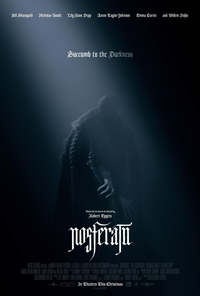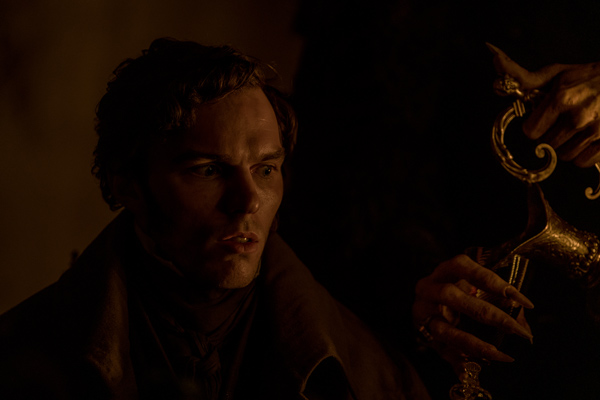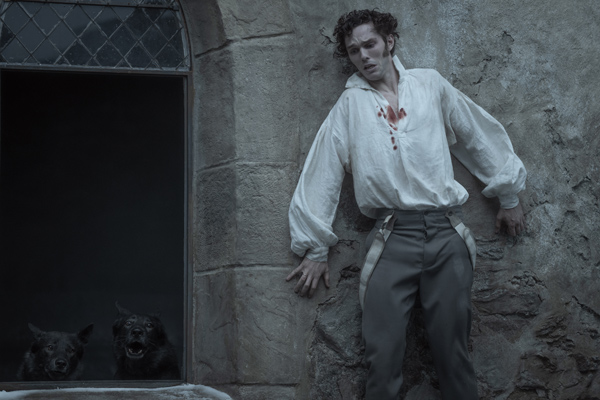Basic Instincts: Eggers Taps Into the Bloodlust with Vampy Remake
 It would seem there’s no one more fitting than Robert Eggers to mount a remake of Nosferatu, the Bram Stoker inspired bloodsucker who first made his appearance in F.W. Murnau’s 1922 silent classic, iconically portrayed by Max Schreck. After his 2015 debut The Witch, Eggers has spent the better part of a decade developing his passion project, which arrives bearing his celebrated signature as a master of dread. There’s no fault to be had with the accomplishments of his regular crew, including the moody production design of Craig Lathrop and the Gothic sensibilities of DP Jarin Blaschke. Composer Robin Carolan’s atmospheric score shores up the ambience for a formidable new theatrical experience to energize a tale as old as cinematic time. And yet, there’s no getting around a sense this newest offering from Eggers is something of a hollow triumph. In the month leading up to its theatrical release, the film has been met with unanimous praise, suggesting it is one of the best horror remakes yet (re)created. But for those familiar with the previous derivations of its titular bloodsucker, this latest version feels like merely the latest metamorphosis in narrative possibilities which still haven’t been allowed to completely unfurl their grotesque potential.
It would seem there’s no one more fitting than Robert Eggers to mount a remake of Nosferatu, the Bram Stoker inspired bloodsucker who first made his appearance in F.W. Murnau’s 1922 silent classic, iconically portrayed by Max Schreck. After his 2015 debut The Witch, Eggers has spent the better part of a decade developing his passion project, which arrives bearing his celebrated signature as a master of dread. There’s no fault to be had with the accomplishments of his regular crew, including the moody production design of Craig Lathrop and the Gothic sensibilities of DP Jarin Blaschke. Composer Robin Carolan’s atmospheric score shores up the ambience for a formidable new theatrical experience to energize a tale as old as cinematic time. And yet, there’s no getting around a sense this newest offering from Eggers is something of a hollow triumph. In the month leading up to its theatrical release, the film has been met with unanimous praise, suggesting it is one of the best horror remakes yet (re)created. But for those familiar with the previous derivations of its titular bloodsucker, this latest version feels like merely the latest metamorphosis in narrative possibilities which still haven’t been allowed to completely unfurl their grotesque potential.
In Germany, 1838, newlywed Thomas Hutter (Nicholas Hoult) has been struggling to assume a position at an Estate Agency run by Knock (Simon McBurney), who tells the aspiring broker he must travel to Bohemia to greet a mysterious potential client, Count Orlok (Bill Skarsgard), a recluse who wishes to buy a palatial estate in their area. But Hutter’s wife, Ellen (Lily-Rose Depp) has fearful premonitions on his journey. An emotionally fragile woman, who has also learned of her recent pregnancy, is left to stay with Hutter’s closest friend Friedrich Harding (Aaron Taylor-Johnson) and his wife Anna (Emma Corrin), who appear to have the relationship and family life thus far eluding Thomas and Ellen. Once at Orlok’s castle, Thomas learns the sinister man is feared by the locals, but while he’s busy acquiring the desired signature on the contract, strange occurrences plague the young man, who awakens to bite marks on his chest. A locket of Ellen’s lilac infused hair seems to send the creepy count into ecstasy, and when Thomas finally decides to flee for his life, Orlok and his coffins board a boat for Germany, and upon arriving, a horde of plague rats descend upon the city. Orlok confronts Ellen with a terrifying ultimatum, just as Thomas arrives in his wake. With the help of Dr. Wilhelm Sievers (Ralph Inseson), the men consult the Paracelsian inclined Professor Albin Eberhart von Franz for assistance.
Across his previous three features, Eggers has prized his abilities in formatting period detail, even with 2022’s The Northman (read review) and its employment of Old Norse language. Immediately, his Nosferatu feels shackled to studio ethnocentrism with a principal cast consisting of Anglo speakers utilizing accented English. This feels absolutely glaring when Hoult steps outside of Hutter’s native country to visit Count Orlok, where the locals conspire in Romanian. However, long gone are the days when two language versions of horror films were made, such as Tod Browning’s Dracula (1931) or even Herzog’s far superior 1979 version of Nosferatu, famously blending Stoker and Murnau while released in both German and English language versions.
Speaking of Herzog, it’s hard to imagine anyone topping Klaus Kinski’s performance as the bald, white-faced peaked creature (something the performer couldn’t later recreate in the abysmal 1988 feature Nosferatu in Venice). And where Eggers seems to stumble the most is with the casting of Bill Skarsgaard as a vampire whose face and voice are completely concealed beneath special effects. This Noserfatu looks more like Belgian actor Jan Bijovet in a giant Cossack uniform, and an altered voice which recalls the necessity to differentiate where Linda Blair ends and Mercedes McCambridge begins in 1973’s The Exorcist. In short, there’s something lost in this imagining of Orlok, and ultimately the physical tangibility of his threat. On the other hand, despite a rather languid pacing before we finally get to the blood and guts of the vampire, Eggers does land the denouement effectively during his death throes.

The film’s other major problem is both the performance of Lily-Rose Depp and the crafting of Ellen Hunter, Orlok’s ultimate target. Eggers puts Ellen front and center, not unlike Francis Ford Coppola did with Winona Ryder in Bram Stoker’s Dracula (1992). Ryder was also something of a disappointment, but the sinister decadence of Gary Oldman tended to eclipse and overcompensate for Coppola’s missteps. Ellen, who was originally supposed to be portrayed by Eggers’ regular Anya Taylor-Joy, seems to be fashioned in the sterling tradition of Isabelle Adjani, who starred in Herzog’s version. But not Adjani as Ellen/Mina, but rather the French star’s iconic turn in Zulawski’s Possession (1981). Repressed sexuality and the specter of hysteria define this version of Ellen, who calls out to the darkness in the film’s opening moments, literally inviting the night to fulfill an unsaid, all-consuming need. Eventually, this becomes clear the need is sexual gratification, as evidenced by Eggers’ most provocative moment when Ellen goads her husband into rough sex suggesting this whole affair is a cuckold situation. But despite the extended running time, especially compared to previous versions, Eggers doesn’t expound on the relationship between Mr. and Mrs. Hutter enough to properly formulate their dysfunction, which leaves Hoult stuck in the same pattern as his predecessors, set adrift in the thankless role of the naive broker who merely serves as a stale dramatic catalyst. Ellen is left to ruminate on whether the evil ‘comes from within,’ but despite a fated sacrifice somehow isn’t ever led to (at least an articulation of) the catharsis she deserves. Depp, who has received formidable praise for her turn, which requires a fair degree of thrashing and drooling, effectively channels sullenness, but there’s not much depth behind her wide, empty gaze.
Instead, Eggers highlights previously neglected supporting characters, with Aaron Taylor-Johnson flouncing about as Friedrich Harding, chewing scenery which negates narrative impact. Someone who knows exactly how to inject this same sort of energy with finesse is another Eggers’ regular, Willem Dafoe, who gets to explore an ulterior motive for Professor Albin Eberhart von Franz (aka Van Helsing). Somehow, Dafoe manages to sell even the saltiest bits of dialogue, such as “I’ve seen things in this world that would have made Isaac Newton crawl back into his womb.”

Since masterful genre films are few and far between in contemporary English language cinema, Eggers’ Nosferatu automatically stands out as a superior gem. But this is recycled material, to be clear, and the limitations which have plagued Murnau’s carbon copy of Stoker have not been removed. The tagline begs us to ‘succumb to the darkness,’ but those already accustomed to the shadows require something infinitely more subversive to swoon.
★★½/☆☆☆☆☆


